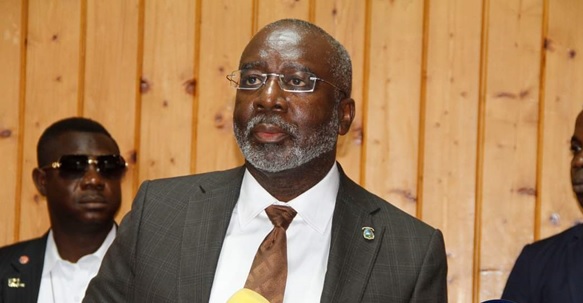MONROVIA – Former Representative Acarous Moses Gray has recently brought attention to a significant constitutional issue raised by Cllr. J. Fonati Koffa, the Speaker of Liberia’s 55th Legislature. According to a social media post by Gray, Koffa has argued that the Civil Service Agency (CSA), established in the 1970s, may be operating illegally in light of the 1986 Constitution. This Constitution, which was adopted to replace the previous legal framework, specifies the establishment of certain autonomous commissions, which Koffa argues should replace agencies like the CSA.
The 1986 Constitution, on Page 27, Chapter X, outlines the creation of Autonomous Public Commissions, including the Civil Service Commission, Elections Commission, and General Auditing Commission. Article 89 of the Constitution states, “The following Autonomous Public Commissions are hereby established: Civil Service Commission; Elections Commission; and General Auditing Commission. The Legislature shall enact laws for the governance of these Commissions and create other agencies as may be necessary for the effective operation of Government.” This explicit language, Koffa contends, indicates that the CSA, as it was set up in the 1970s, was made defunct by the new Constitution’s mandate.
Koffa’s argument is that the Constitution’s phrasing, “hereby established,” implies that the CSA should no longer be recognized as a valid entity. Instead, the Constitution prescribes that the governance of these commissions should be determined by laws enacted by the Legislature, not through executive orders or decrees. Critics of the CSA’s continued existence argue that the current body was a result of a “gentleman’s agreement” rather than a constitutionally endorsed entity, and as such, its continued operation without legislative sanction is questionable.
Additionally, Koffa’s critics assert that using CSA standing orders to regulate or influence legislative functions violates the separation of powers principle enshrined in the Constitution. They argue that such executive actions infringe upon legislative autonomy and undermine constitutional governance. This concern extends to allegations that the Executive Branch has used the CSA to harass and exert undue pressure on the House of Representatives, including through the arbitrary dismissal of public sector workers.
The controversy has sparked a broader debate about executive overreach and the need for strict adherence to constitutional principles. Many argue that the CSA’s leadership, along with its nomination and confirmation processes, may be legally invalid under the 1986 Constitution. They contend that any actions or regulations imposed by the CSA are unconstitutional and not in line with the revised legal framework of Liberia.
In response to these arguments, Speaker Koffa and other members of House leadership have been commended for raising this constitutional issue. Their efforts highlight a critical examination of the legal foundations of Liberia’s public institutions and emphasize the importance of ensuring that all governmental bodies operate within the bounds of the Constitution.
The ongoing debate underscores the need for a thorough review of the CSA’s role and legitimacy, and whether its continued existence aligns with the constitutional framework established in 1986. This issue has significant implications for the governance of Liberia and the separation of powers between the branches of government.
As discussions continue, it will be essential for the Legislature to address these concerns and ensure that all aspects of government comply with constitutional mandates. This situation not only raises questions about the CSA but also about the broader integrity and effectiveness of Liberia’s legal and governmental institutions.







